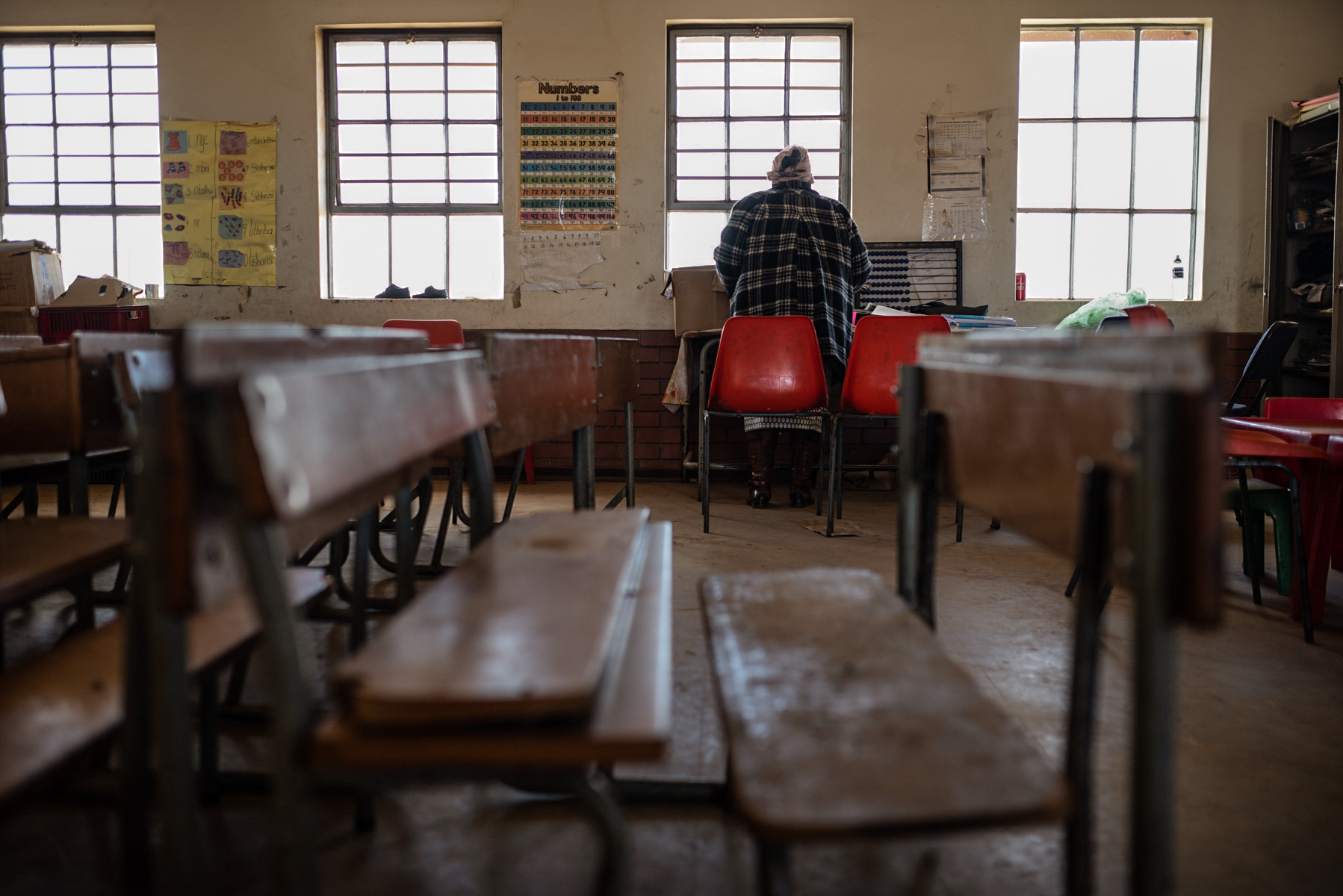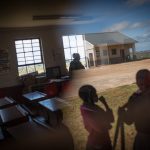School readiness in question as coronavirus spreads
Science has given the green light to schools reopening as children are unlikely to catch or transmit Covid-19. But the lack of water and toilets in addition to overcrowding at no-fee schools poses …
Author:
25 May 2020

A great debate has raged about whether or not schools are ready to reopen after being closed for a number of weeks during the government’s Covid-19 lockdown. The National Coronavirus Command Council and Cabinet approved the reopening of schools for 1 June.
The desperation of no-fee schools, in particular, came to the fore during the lockdown. Issues of dire infrastructure backlogs, overcrowding and poor sanitation facilities were highlighted.
When considering factors from school infrastructure to learning outcomes, there are essentially two education systems in South Africa, and learning from home has been challenging for pupils struggling with access to data and internet connectivity.
Related article:
Pupils with learning difficulties and specialised educational needs have been left behind. “This is already a vulnerable group that requires specialised, time-sensitive education and support. Wide-scale, specialised programmes are not available to children with special educational needs and disabilities, and generic home schooling and e-learning solutions may not be suitable,” write University of the Western Cape academics Athena Pedro, Bronwyn Mthimunye and Ella Bust on The Conversation website.
It is commendable that the Department of Basic Education is trying to recover the school calendar through a phased-in approach based on grades. But infrastructure backlogs at no-fee schools pose health risks for their pupils and teachers. With Covid-19 spreading in South Africa, increasing the risk of infection as more people contract the coronavirus, the stringent safety measures and basic services needed to comply with them make the disparities in the education system even more noticeable as schools reopen.
Water and sanitation
“The success of the reopening process depends on the availability of basic services,” said Minister of Basic Education Angie Motshekga. But it’s well known that many no-fee schools lack basic services, from water supply to toilets and sewage. The department missed the 29 November 2016 deadline to upgrade schools as set out in the minimum norms and standards for school infrastructure in 2013, which define the basic amenities required in schools and are legally binding.
Among these norms and standards are access to water, ablution facilities and a class size of 40 or fewer pupils. All three are crucial during the Covid-19 pandemic as schoolchildren will be required to practise social distancing, and having fewer pupils in a class minimises the risk of the spread of the virus. Pupils will also have to wash their hands frequently with soap and water for at least 20 seconds.
As such, it is essential that the department address these issues as teachers, grade 7 and grade 12 pupils return to school. Motshekga said on 30 April that during consultations with her department about how to reopen schools, they had “started with the safety of our learners, teachers and employees. We made safety a priority.” This priority should extend to low-income areas where the condition of schools is disheartening.

“Running water, safe and clean classrooms and actual toilet facilities are a luxury for most children attending schools in rural Vhembe. They make do with dilapidated classrooms, water shortages and pit toilets,” writes Ndivhuwo Mukwevho for the Health eNews website about sanitation conditions in Limpopo.
“Long before the lockdown, we have been complaining to the provincial Department of Education for them to at least build us toilets, but all our pleas always fell on deaf ears. There is no way we can send our children to a school without a toilet, especially during this time when we are being told to always practise proper hygiene. Where will learners relieve themselves when a call of nature comes as the school does not have any toilet,” Waterval High school governing body chairperson Endy Munyai told Health eNews.
School furniture
Motshekga said no more than two pupils will be allowed to share a desk. But overcrowded classrooms are common at no-fee schools, with up to 80 pupils in a class, or two classes sharing a room. A shortage of furniture also often forces a number of pupils to share a desk.
New Frame recently reported on the shortage of desks and chairs at two schools – one newly built, the other dilapidated – in Bizane in the Eastern Cape. The principals of both schools raised the issue of school furniture, with Mjanyelwa Junior Secondary principal Bulelani Mazimbeni saying the lack of furniture in schools across Bizana was something “we all complain of as schools receive chairs without tables”.
Related article:
The Citizen newspaper has also reported on the shortage of school furniture in the Eastern Cape, saying that the provincial education department “wants to eradicate the shortage of furniture at schools … There is a shortage of more than 10 000 desks and chairs for pupils, while teachers need more than 10 000 tables and 16 000 chairs in schools in the province.”
Practising social distancing will be a challenge for pupils at schools with a shortage of furniture and overcrowded classrooms. It is not clear how these schoolchildren will be split into smaller classes or whether there are enough teachers to allow for this. Additionally, will teachers who are thinly spread have the training and knowledge to teach grades outside of their usual classes? Or will the pupils’ progress be hindered by a shortage of teachers?
Transport for pupils
The department will have to look into school transport, another of its unresolved issues. Across the country, schoolchildren undertake long and short journeys to get to school. Some use public transport, others use private transport – individually owned taxis or buses that parents pay to ferry their children – and the rest walk to school. Pupils in rural areas have been known to commute 26km to and from school. Private transport has its shortfalls, with children dying as a result of speeding drivers and overloaded vehicles. Last year, the police pulled over a 16-seater taxi in Port Elizabeth that was carrying 48 schoolchildren.
School transport is a long-contested issue. Advocacy group Equal Education had to go to the courts to get the provincial education department to release a draft policy on transport for schoolchildren. “Our relentless campaign for scholar transport since 2014, and our legal challenge in the Pietermaritzburg high court, has succeeded in getting the KwaZulu-Natal Department of Education to release a draft scholar transport policy, for public comment,” it said.
The time pupils spend commuting affects their learning outcomes and transport should be declared integral to basic education. The department would be in a better position to ensure pupil safety during the coronavirus pandemic had a school transport system already been in place.

A 2015 study by Deborah Machard and Tracey Morton McKay, titled School Choice, School Costs: The Case of Inner-city Johannesburg Private Schools, looks at the commute of Joburg pupils between their homes and their inner-city, low-cost private schools. “The majority (41%) of learners use minibus taxis to get to school. Of the remainder, some 19% use the bus, 6% use private cars and 5% use the train. Significantly, some 29% walk to school as they lived in the inner city.”
The study may be specific to Johannesburg, but the factors that influence school choice are likely similar throughout the country because of the poor state of no-fee schools and pupils likely use similarly varied forms of transport.
The government will have to formulate and implement a plan that covers all forms of transport to allow schoolchildren to travel safely to and from school during the lockdown. Motshekga said her department would be working with the Department of Transport to ensure that safety protocols are maintained, such as sanitising hands and maintaining an acceptable distance between passengers on public transport.
Science gives the go-ahead
University of the Witwatersrand vaccinology and infectious diseases expert Shabir Madhi told the TimesLive news website that new evidence shows children “are insignificant spreaders of the virus … The strategy of keeping schools closed is not in the interests of our children. Delaying the curriculum for a year is not so bad for a child of 12, but for children under seven, when cognitive development is at its height, there is no way to regain the loss to the shaping of the mind that happens and is incurred by being out of school.” He added that keeping children out of school “shows a lack of understanding in terms of the virus”.
Stellenbosch University researcher Nic Spaull also supports the return of pupils to school. He wrote in a paper titled Policy brief: Who should go back to school first in South Africa? that as “children under 10 are least susceptible to Covid-19, they should go back first”.
Spaull said his policy brief aims to summarise some of the emerging international evidence. “The latest evidence suggests that by allowing the youngest children to go back first, policy makers are putting teachers and parents at lower risk than if high school learners went back to school first. As two paediatric infectious disease experts explain, ‘Severe Covid-19 is as rare as many other serious infection syndromes in children that do not cause schools to be closed.’”
Related article:
Madhi did agree, though, that the country should not be “reckless” in opening schools and that certain measures should be mandatory. “These would include physical distancing, a staggered approach to the school day, a phased-in approach to opening schools again, teachers carrying hand sanitiser in their pockets, water and soap available for all children, assemblies and other school gatherings no longer allowed, teachers moving from class to class rather than pupils doing so, and teachers no longer sitting together in a closed space for meetings and tea breaks,” he told TimesLive.
Science may support reopening schools, but as a recent Southern African Development Community report on the regional response to Covid-19 states: “The member states intending to reopen schools should consider putting in place the following as a basic minimum, which should include but not be limited to basic hygiene, water and sanitation facilities; availability of cleaners and screeners; providing additional teaching staff to decongest classrooms as well as mobile classrooms; compulsory wearing of masks; sanitisation and disinfection of classrooms and common areas; and enforcing extreme social distancing in classrooms and on school buses.”



